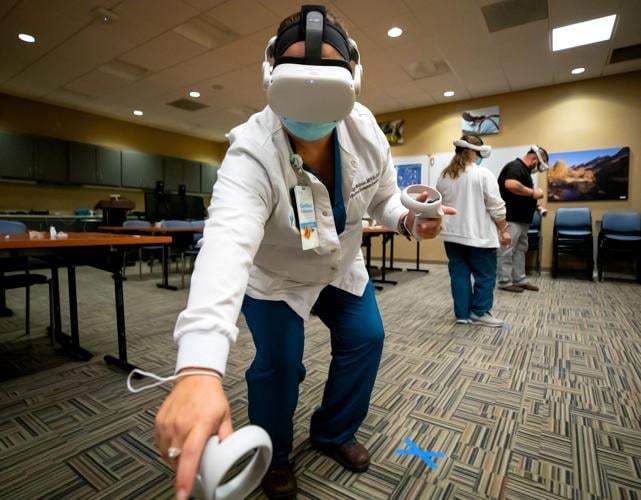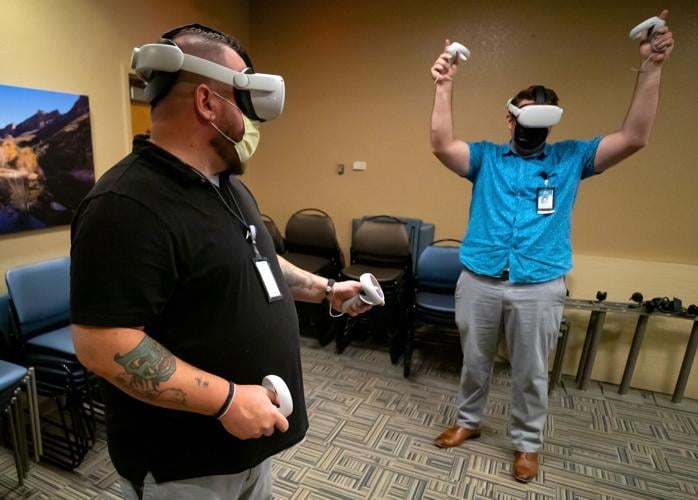A new virtual reality training program at Tucson Medical Center is helping train employees in tasks that can be high risk for injuries.
The new training allows for mistakes to happen without consequences for nurses, patient care technicians and environmental services staff.
And it can all happen in a 3-square-foot space.
“We don’t need to waste a hospital room. We don’t need to waste product. … In virtual reality is automatic. You go reset, you make mistakes, you learn. You do it again and you can do it as many times as you need until you’re ready,” said Robin Moulder, the CEO of 3lbXR.
The hospital partnered with the company for the virtual reality pilot program that allows trainees to immerse themselves in health care settings to practice high-risk tasks.
“Having an opportunity to do this kind of training, that is really considered high risk, in a safe environment where they can make mistakes and the mistakes don’t have any serious consequences because they can correct it and try it again,” said Dr. Anissa Guzman, director of professional practice for TMC.
This simulated training includes scenarios for nursing and environmental services staff in topics related to sanitation, room cleaning, falls and suicide prevention.
A headset is all that’s required to be transported to a virtual reality workspace that mirrors rooms at TMC.
“We have limited resources in health care right now,” said Cam Dyman, TMC’s applications training lead. “We need to be able to train our staff in a standardized and consistent manner, and this allows us to do that with minimal resources.”
Photos: Virtual reality training for nurses at Tucson Medical Center
VR training for nurses
Updated
Sherilyn Wollman, registered nurse, pics up an item while working on a virtual reality training scenario during a VR training at Tucson Medical Center on June 27, 2022.
VR training for nurses
Updated
While partnering on a virtual reality training scenario, Ash Watkins, right, clinical trainer, looks toward Shane Elfering, registered nurse, who reacts to a task Watkins did during a VR training at Tucson Medical Center in Tucson, Ariz., on June 27, 2022.
VR training for nurses
Updated
Chris Castaldi, 3lbXR technical director, demonstrates how to use a virtual reality training scenario during a VR training at Tucson Medical Center in Tucson, Ariz. on June 27, 2022.
VR training for nurses
Updated
Registered nurses Sherilyn Wollman, right, and Trisha Douglass put on their virtual reality headsets during a VR training at Tucson Medical Center in Tucson, Ariz. on June 27, 2022.
VR training for nurses
Updated
Nancy Berrones, registered nurse, along with other registered nurses and Tucson Medical Center staff, watch as Chris Castaldi, 3lbXR technical director, demonstrates how to use the virtual realty training during a VR training at Tucson Medical Center in Tucson, Ariz. on June 27, 2022.
VR training for nurses
Updated
Ash Watkins, left, clinical trainer, gets used to the virtual reality headset while Tucson Medical Center registered nurses put on their VR headsets during a VR training at Tucson Medical Center in Tucson, Ariz. on June 27, 2022.





